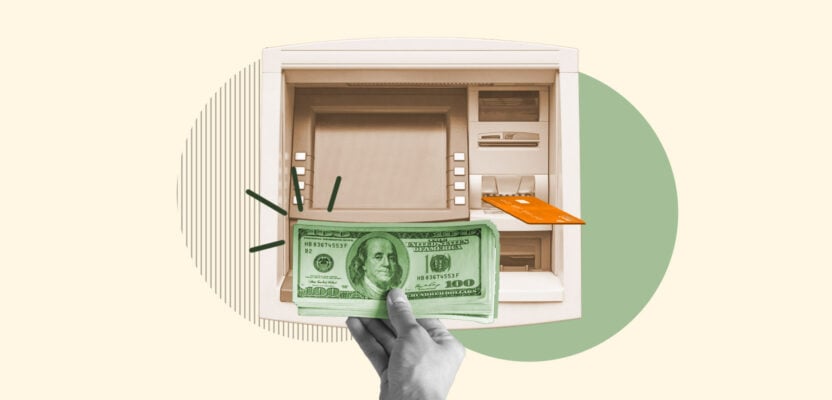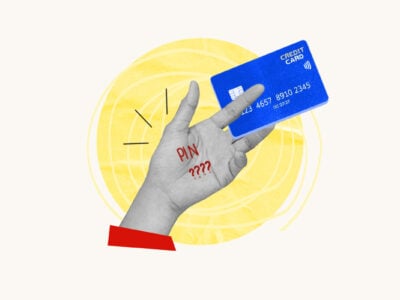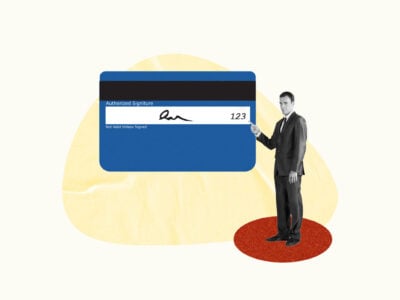While credit cards are great financial resources, sometimes you need cold, hard cash. Fortunately, it’s possible to get cash from your credit card. But how do you do that, and what are the possible downsides?
Read on to learn about taking cash out with your credit card, the ways you can do it, and what the consequences may be.
Table of Contents
Can you take out cash with a credit card?
Yes, you can take cash out with a credit card. In fact, there are multiple ways of doing this. All of them have pros and cons, which we’ll cover below.
Keep in mind that taking cash out on your credit card will almost always come with fees and higher-than-normal interest rates, so if you can, it’s better to just use your credit card normally or to withdraw money using a debit card.
If you’re withdrawing cash on your card as a way of racking up extra credit card points, you should definitely reconsider. You’ll almost certainly lose more money in fees than you’ll make back in rewards.
Essentially, withdrawing cash with your card is something that you can do in a pinch, but it should never be your first choice.
How do you get cash from a credit card?
If you need to use your credit card to grab some fast cash, there are a few ways to achieve this. The three most common ways are:
1. Cash advance
A credit card cash advance is when you use your credit card to withdraw money at an ATM. This is the most common method of getting cash with a credit card. Cash advances are relatively easy to perform, accessible, and get you money right away.
How to perform a cash advance
To perform a cash advance, follow these steps:
- Go to an ATM that accepts your credit card type (e.g., Visa, Mastercard, etc.).
- Put your card into the ATM and enter your credit card PIN number.
- Select “Withdrawal” or “Cash Advance” when asked what type of transaction you want to make.
- Enter the amount of cash you’d like to withdraw.
- Accept the fees and terms and verify the transaction.
- Take your cash and take back your credit card from the ATM.
- Wait for the withdrawal to show up on your credit card statement.
- Pay off the withdrawal balance as soon as possible.
You’ll notice that credit card cash advances work much the same way as debit card cash withdrawals. The main difference is that instead of coming directly out of your checking account (as with a debit card), your cash advance will be added to your credit card balance as a debt, and will probably come with additional charges.
Downsides of cash advances
While cash advances are the main technique for taking money out on a credit card, they have considerable downsides, including:
- ATM fees: Often when you use a card to withdraw money from an ATM (whether a debit or credit card), the ATM will take out a usage fee. While some credit cards have in-network ATMs that don’t charge a fee for cards within that network, it’s common for ATMs to tack on a surcharge.
- Cash advance fees: Most credit cards have cash advance fees. They’re usually expressed as a percentage of your transaction amount, with an absolute amount as a minimum. For example, your credit card might have a cash advance fee of 5% of the withdrawal amount or $5—whichever amount is higher. Cash advance fees are usually between 3%–5% with either $5 or $10 minimums.
- Cash advance APR: Along with the cash advance fee, most credit cards charge a cash advance APR. APR on a credit card is the annual interest rate on your transaction. Cash advance APRs are usually higher than regular APRs (meaning you’ll accrue more interest on a cash advance), and cash advances are usually exempt from grace periods, which are periods of your credit card billing cycle which don’t charge interest. This means you’ll be charged interest right from the time of the advance.
Because of the extra costs of credit card cash advances, only consider making one if you’ve explored your other options first. For example, if you need cash for rent, keep in mind that there are other ways to pay rent with a credit card.
2. Money order
A money order is an alternative to a check that operates in a similar way. They’re paid for upfront and made out to a specific recipient for a dollar amount. Only the listed recipient is able to cash a money order.
As money orders are more secure than checks (which can bounce) and more trackable than cash, many businesses and individuals request money orders for certain purchases in lieu of cash.
You can buy a money order using your credit card at the following locations:
- 7-Eleven stores
- Western Unions 1
Downsides of money orders
As with cash advances, there are several cons to take into consideration before committing to a money order, like:
- Limited locations: As mentioned, there are only two places you can get a money order with a credit card. (If you’re getting a money order with a debit card or cash, on the other hand, you can go to a variety of places, including post offices, grocery stores, and banks.)
- Money order fees: Money orders usually come with a processing fee around $1.25–$1.75.
- Cash advance fees: More than likely, your credit card issuer will register your money order purchase as a cash advance. So you’ll be subject to the same cash advance fees as you would with an ATM cash advance.
- Cash advance APR: Your money order transaction will probably be charged the same interest rate as a cash advance (which, again, will be higher than your normal APR). If you’re not sure whether or not this applies to you, check your credit card’s rates and fees, or contact your card issuer.
3. Wire transfer
You can perform a wire transfer by sending money from your credit card account to your checking account and then withdrawing the money in cash. You can do this by visiting a money transfer service’s website (e.g., Western Union).
Downsides of credit card wire transfers
Wire transfers come with the same pitfalls as money orders: they may have a processing fee, and are subject to the same fees and interest rates as cash advances.
As you may be gathering, credit cards aren’t really intended to provide cash—you’re usually meant to make direct purchases with them. This is why all of the methods outlined above come with significant downsides, such as fees. To avoid those, you’ll have to perform some kind of workaround.
How to get cash from a credit card without charges
Getting cash from a credit card without getting hit with additional fees can be tricky. However, there are ways it can be done.
If you’re set on not paying cash advance or ATM fees, consider the following options:
Buy and resell items
It won’t get you cash very quickly, but you can consider making a purchase on your credit card then selling the physical item for cash.
For example, you can look on Craigslist or Facebook Marketplace for items selling for the amount you need in cash. Then purchase one of those items using your credit card. Post the item on a marketplace or buy-sell-trade group and specify that only cash offers will be accepted.
While this method gets around cash advance fees and other charges, there are obviously still negatives:
- No guarantees: Buying and selling is a risky business no matter what. You aren’t guaranteed to get the price you ask or to sell your item at all. You may end up spending money and wasting time without ever getting the cash you’re looking for.
- Slow returns: If you’re looking for quick cash, this is definitely not the method for you. This strategy has inherent time constraints, and there’s no telling how long it will take to sell what you have on offer.
- Likely to lose money: Unfortunately, you’re likely to lose as much money, or more, in this transaction as you would by paying for a cash advance. If you buy a product with your credit card at full price, you can likely only sell it for cash for a fraction of that cost.
Purchase gift cards
A similar gambit to buying and selling goods is to buy and sell gift cards. You can purchase gift cards using your credit card, then sell those gift cards online for a discounted price. For example, you can buy a $100 Amazon gift card with your credit card, then sell it for $80 cash.
The cons are the same as those you’ll face when buying and selling items: there are no guarantees and you’re likely to lose money in the deal.
If you do take this approach, look for gift cards from companies that have partnerships with your credit card issuer, or companies that earn you cash back on purchases (and don’t exclude gift cards from those purchases), so you can lessen your money loss.
Buy Visa gift cards
As an alternative to store-specific gift cards, you can purchase Visa gift cards with your credit card. Beware that only some retailers will allow you to do this. However, you can purchase them directly from the Visa online store if you have time to spare while waiting for the card to arrive.
Redeem rewards
If you have a rewards credit card, you may be able to redeem your cashback rewards or credit card miles for cash. If you’ve racked up enough points on a standard credit card, you may have the option to redeem those points as a bank deposit or mailed check.
If you redeem your points this way, you can then take the deposit out in cash at a bank or cash your check. The downside here is that there will be a delay between point redemption and cashing out (you’ll either need to wait for the bank transfer to process or for a check to mail).
The second option is to redeem points on a store credit card for quicker cash. If you have a retail rewards card, you may have the option to cash out your rewards in a store. For example, if you have a Sam’s Club credit card, you may be able to redeem your points at checkout at a Sam’s Club or Walmart location in exchange for cash.
Is getting cash from your credit card worth it?
Most of the time, using your credit card to get cash isn’t worth it. All the standard methods of doing so come with extra fees (and significantly higher interest rates), which make them a bad move, financially speaking.
As you’ve probably gathered, the various workarounds have similar downsides—you’re likely to lose money on the transaction, whichever method you choose. Moreover, they’re all fairly complicated to pull off.
The takeaway is that, while it’s possible to get cash from your credit card, it’s rarely your best option. There are usually cheaper and easier ways to get money, and you should avoid using your credit card unless you’re in a real bind.
How to get cash from a credit card without a PIN
If you decide to take out a cash advance but don’t have a PIN (or you don’t know your PIN), you can go to a bank and ask to make a credit card withdrawal. You’ll probably be asked to show some form of identification, but you won’t have to enter a PIN.
While you’re there, ask whether or not they can help you set up a PIN, in case you need it for future transactions. If they can’t, contact your issuer and request a PIN. They should send you one in the mail or online.






